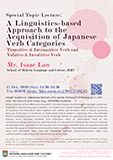Target audience
Japanese learners who speak Chinese/Cantonese as L1 with over 160 hours of prior study (e.g. JAPN2088 students)
Medium: English and Japanese (with Chinese/Cantonese)
Abstract
Being conscious of the differences between L1 (mother tongue) and the target language is extremely important in second language acquisition. For students who speak Chinese/Cantonese as L1, the use of transitive and intransitive verbs together with volitive and involitive verbs is always confusing because of the lack of awareness of tense-aspect-mood system in Japanese. Also, the potential effects of Chinese/Cantonese (L1) syntactic language transfer on Japanese are observed when the learners have acquired transitive and intransitive verbs at intermediate level as the unnatural-sounding sentences are used frequently. It is necessary to introduce the syntactic features of Japanese verb, especially for the learners who have learnt potential forms of Japanese and will acquire the usage of transitive and intransitive verbs. In addition, the relationship between potential forms and intransitive verbs, and the differences between transitive-intransitive verbs and volitive-involitive verbs should also be introduced at this stage.
Mr. Isaac Lau is an Assistant Lecturer in the Department of Japanese Studies at The University of Hong Kong. He is a linguist of second/third language acquisition with research interests in crosslinguistic influence and morphosyntactic transfer. |


